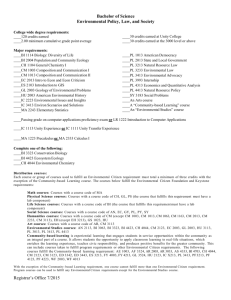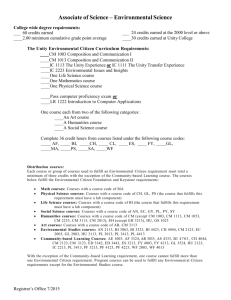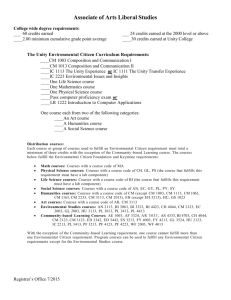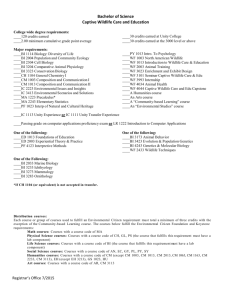Bachelor of Science Earth and Environmental Science Program
advertisement
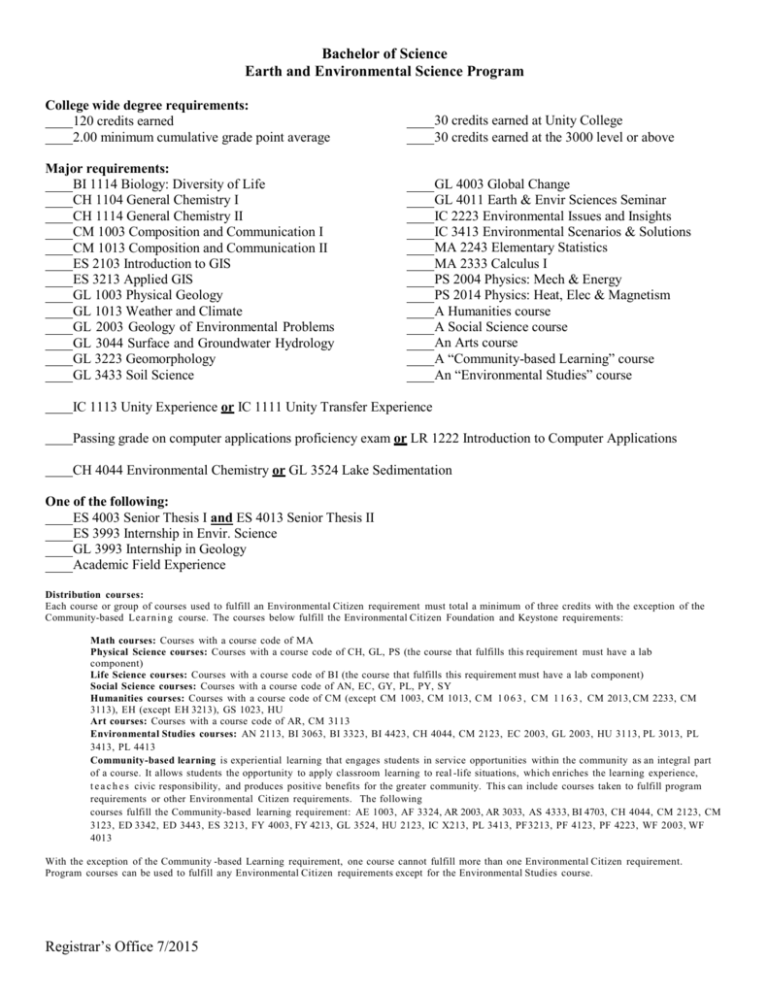
Bachelor of Science Earth and Environmental Science Program College wide degree requirements: 120 credits earned 2.00 minimum cumulative grade point average 30 credits earned at Unity College 30 credits earned at the 3000 level or above Major requirements: BI 1114 Biology: Diversity of Life CH 1104 General Chemistry I CH 1114 General Chemistry II CM 1003 Composition and Communication I CM 1013 Composition and Communication II ES 2103 Introduction to GIS ES 3213 Applied GIS GL 1003 Physical Geology GL 1013 Weather and Climate GL 2003 Geology of Environmental Problems GL 3044 Surface and Groundwater Hydrology GL 3223 Geomorphology GL 3433 Soil Science GL 4003 Global Change GL 4011 Earth & Envir Sciences Seminar IC 2223 Environmental Issues and Insights IC 3413 Environmental Scenarios & Solutions MA 2243 Elementary Statistics MA 2333 Calculus I PS 2004 Physics: Mech & Energy PS 2014 Physics: Heat, Elec & Magnetism A Humanities course A Social Science course An Arts course A “Community-based Learning” course An “Environmental Studies” course IC 1113 Unity Experience or IC 1111 Unity Transfer Experience Passing grade on computer applications proficiency exam or LR 1222 Introduction to Computer Applications CH 4044 Environmental Chemistry or GL 3524 Lake Sedimentation One of the following: ES 4003 Senior Thesis I and ES 4013 Senior Thesis II ES 3993 Internship in Envir. Science GL 3993 Internship in Geology Academic Field Experience Distribution courses: Each course or group of courses used to fulfill an Environmental Citizen requirement must total a minimum of three credits with the exception of the Community-based Le a rn i n g course. The courses below fulfill the Environmental Citizen Foundation and Keystone requirements: Math courses: Courses with a course code of MA Physical Science courses: Courses with a course code of CH, GL, PS (the course that fulfills this requirement must have a lab component) Life Science courses: Courses with a course code of BI (the course that fulfills this requirement must have a lab component) Social Science courses: Courses with a course code of AN, EC, GY, PL, PY, SY Humanities courses: Courses with a course code of CM (except CM 1003, CM 1013, C M 1 0 6 3 , C M 1 1 6 3 , CM 2013, CM 2233, CM 3113), EH (except EH 3213), GS 1023, HU Art courses: Courses with a course code of AR, CM 3113 Environmental Studies courses: AN 2113, BI 3063, BI 3323, BI 4423, CH 4044, CM 2123, EC 2003, GL 2003, HU 3113, PL 3013, PL 3413, PL 4413 Community-based learning is experiential learning that engages students in service opportunities within the community as an integral part of a course. It allows students the opportunity to apply classroom learning to real -life situations, which enriches the learning experience, t e a c h e s civic responsibility, and produces positive benefits for the greater community. This can include courses taken to fulfill program requirements or other Environmental Citizen requirements. The following courses fulfill the Community-based learning requirement: AE 1003, AF 3324, AR 2003, AR 3033, AS 4333, BI 4703, CH 4044, CM 2123, CM 3123, ED 3342, ED 3443, ES 3213, FY 4003, FY 4213, GL 3524, HU 2123, IC X213, PL 3413, PF 3213, PF 4123, PF 4223, WF 2003, WF 4013 With the exception of the Community -based Learning requirement, one course cannot fulfill more than one Environmental Citizen requirement. Program courses can be used to fulfill any Environmental Citizen requirements except for the Environmental Studies course. Registrar’s Office 7/2015
